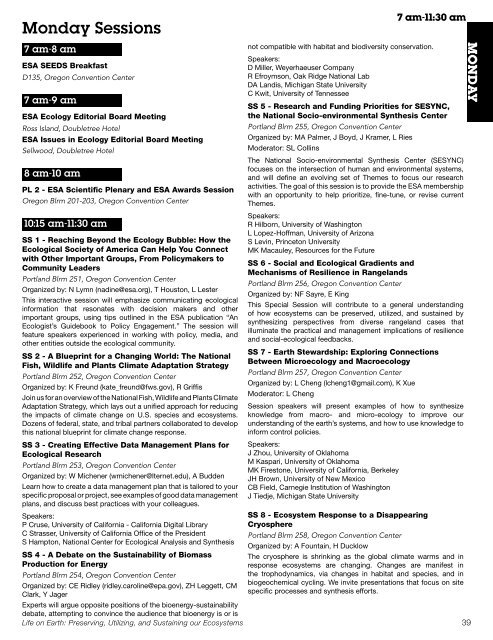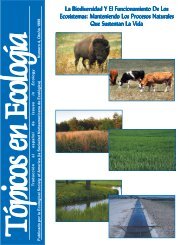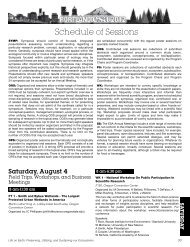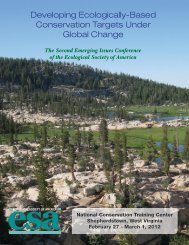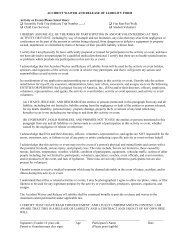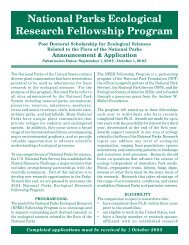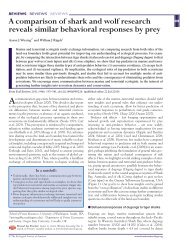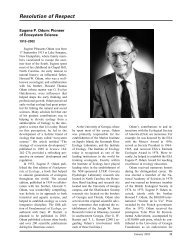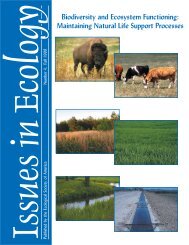Printed Program (PDF) - Ecological Society of America
Printed Program (PDF) - Ecological Society of America
Printed Program (PDF) - Ecological Society of America
Create successful ePaper yourself
Turn your PDF publications into a flip-book with our unique Google optimized e-Paper software.
monday sessions<br />
7 am-8 am<br />
ESA SEEDS Breakfast<br />
D135, Oregon Convention Center<br />
7 am-9 am<br />
ESA Ecology Editorial Board Meeting<br />
Ross Island, Doubletree Hotel<br />
ESA Issues in Ecology Editorial Board Meeting<br />
Sellwood, Doubletree Hotel<br />
8 am-10 am<br />
PL 2 - ESA Scientific Plenary and ESA Awards Session<br />
Oregon Blrm 201-203, Oregon Convention Center<br />
10:15 am-11:30 am<br />
SS 1 - Reaching Beyond the Ecology Bubble: How the<br />
<strong>Ecological</strong> <strong>Society</strong> <strong>of</strong> <strong>America</strong> Can Help You Connect<br />
with Other Important Groups, From Policymakers to<br />
Community Leaders<br />
Portland Blrm 251, Oregon Convention Center<br />
Organized by: N Lymn (nadine@esa.org), T Houston, L Lester<br />
This interactive session will emphasize communicating ecological<br />
information that resonates with decision makers and other<br />
important groups, using tips outlined in the ESA publication “An<br />
Ecologist’s Guidebook to Policy Engagement.” The session will<br />
feature speakers experienced in working with policy, media, and<br />
other entities outside the ecological community.<br />
SS 2 - A Blueprint for a Changing World: The National<br />
Fish, Wildlife and Plants Climate Adaptation Strategy<br />
Portland Blrm 252, Oregon Convention Center<br />
Organized by: K Freund (kate_freund@fws.gov), R Griffis<br />
Join us for an overview <strong>of</strong> the National Fish, Wildlife and Plants Climate<br />
Adaptation Strategy, which lays out a unified approach for reducing<br />
the impacts <strong>of</strong> climate change on U.S. species and ecosystems.<br />
Dozens <strong>of</strong> federal, state, and tribal partners collaborated to develop<br />
this national blueprint for climate change response.<br />
SS 3 - Creating Effective Data Management Plans for<br />
<strong>Ecological</strong> Research<br />
Portland Blrm 253, Oregon Convention Center<br />
Organized by: W Michener (wmichener@lternet.edu), A Budden<br />
Learn how to create a data management plan that is tailored to your<br />
specific proposal or project, see examples <strong>of</strong> good data management<br />
plans, and discuss best practices with your colleagues.<br />
Speakers:<br />
P Cruse, University <strong>of</strong> California - California Digital Library<br />
C Strasser, University <strong>of</strong> California Office <strong>of</strong> the President<br />
S Hampton, National Center for <strong>Ecological</strong> Analysis and Synthesis<br />
SS 4 - A Debate on the Sustainability <strong>of</strong> Biomass<br />
Production for Energy<br />
Portland Blrm 254, Oregon Convention Center<br />
Organized by: CE Ridley (ridley.caroline@epa.gov), ZH Leggett, CM<br />
Clark, Y Jager<br />
Experts will argue opposite positions <strong>of</strong> the bioenergy-sustainability<br />
debate, attempting to convince the audience that bioenergy is or is<br />
Life on Earth: Preserving, Utilizing, and Sustaining our Ecosystems<br />
7 am-11:30 am<br />
not compatible with habitat and biodiversity conservation.<br />
Speakers:<br />
D Miller, Weyerhaeuser Company<br />
R Efroymson, Oak Ridge National Lab<br />
DA Landis, Michigan State University<br />
C Kwit, University <strong>of</strong> Tennessee<br />
SS 5 - Research and Funding Priorities for SESYNC,<br />
the National Socio-environmental Synthesis Center<br />
Portland Blrm 255, Oregon Convention Center<br />
Organized by: MA Palmer, J Boyd, J Kramer, L Ries<br />
Moderator: SL Collins<br />
The National Socio-environmental Synthesis Center (SESYNC)<br />
focuses on the intersection <strong>of</strong> human and environmental systems,<br />
and will define an evolving set <strong>of</strong> Themes to focus our research<br />
activities. The goal <strong>of</strong> this session is to provide the ESA membership<br />
with an opportunity to help prioritize, fine-tune, or revise current<br />
Themes.<br />
Speakers:<br />
R Hilborn, University <strong>of</strong> Washington<br />
L Lopez-H<strong>of</strong>fman, University <strong>of</strong> Arizona<br />
S Levin, Princeton University<br />
MK Macauley, Resources for the Future<br />
SS 6 - Social and <strong>Ecological</strong> Gradients and<br />
Mechanisms <strong>of</strong> Resilience in Rangelands<br />
Portland Blrm 256, Oregon Convention Center<br />
Organized by: NF Sayre, E King<br />
This Special Session will contribute to a general understanding<br />
<strong>of</strong> how ecosystems can be preserved, utilized, and sustained by<br />
synthesizing perspectives from diverse rangeland cases that<br />
illuminate the practical and management implications <strong>of</strong> resilience<br />
and social-ecological feedbacks.<br />
SS 7 - Earth Stewardship: Exploring Connections<br />
Between Microecology and Macroecology<br />
Portland Blrm 257, Oregon Convention Center<br />
Organized by: L Cheng (lcheng1@gmail.com), K Xue<br />
Moderator: L Cheng<br />
Session speakers will present examples <strong>of</strong> how to synthesize<br />
knowledge from macro- and micro-ecology to improve our<br />
understanding <strong>of</strong> the earth’s systems, and how to use knowledge to<br />
inform control policies.<br />
Speakers:<br />
J Zhou, University <strong>of</strong> Oklahoma<br />
M Kaspari, University <strong>of</strong> Oklahoma<br />
MK Firestone, University <strong>of</strong> California, Berkeley<br />
JH Brown, University <strong>of</strong> New Mexico<br />
CB Field, Carnegie Institution <strong>of</strong> Washington<br />
J Tiedje, Michigan State University<br />
SS 8 - Ecosystem Response to a Disappearing<br />
Cryosphere<br />
Portland Blrm 258, Oregon Convention Center<br />
Organized by: A Fountain, H Ducklow<br />
The cryosphere is shrinking as the global climate warms and in<br />
response ecosystems are changing. Changes are manifest in<br />
the trophodynamics, via changes in habitat and species, and in<br />
biogeochemical cycling. We invite presentations that focus on site<br />
specific processes and synthesis efforts.<br />
MONDAY<br />
39


